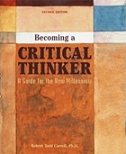From Abracadabra to Zombies
Skeptimedia
Facilitating a Dangerous Delusion at MIT
09 July 2011. MIT will host Syracuse University's Summer Institute on Communication and Inclusion this July 20-22. The title of the conference does not reveal that the conference will provide a bully pulpit for advocates of the discredited pseudoscience known as facilitated communication (FC). Rosemary Crossley, who first gave the world this cruel process that allows others "to impose their own wishes, fears, hopes, and agendas on nonspeaking individuals,"* will speak. So will her partner Chris Bothwick.
According to posted information on the sessions to be held at MIT, Bothwick is going to give Crossley's and his version of how FC got started. He will detail the current legal battle he and Crossley are going through and note the parallels to a similar battle years ago that led to the FC movement. Their version is that in each case a child with severe cerebral palsy was institutionalized and declared to be severely retarded until Crossley figured out how to tap into their brains. She discovered the children weren't retarded, but quite bright. The parents of the children and the professionals who assessed Annie McDonald and Leone McFarlane wrongly assessed them, according to Crossley. Her method of FC was used to produce a book listing her and McDonald as co-authors. The book was called Annie's Coming Out and it told the story of Crossley's breakthrough method of communicating with those who others thought were unable to communicate because of faulty brains. The book was made into an award-winning movie and the FC movement and Crossley's status as heroine were born.
Many professionals suspected that Crossley was deceiving herself, that she was unconsciously manipulating Annie's hands to communicate thoughts that originated in Crossley's own head.
Sufficiently serious issues arose to provoke formal statements of concern from professionals and parents in 1988, and a government-sponsored investigation in 1989. Despite Crossley's resistance to objective testing (on the basis that FC users refused to cooperate when their competence was questioned), some small-scale controlled evaluations were conducted in the course of that investigation. When the facilitator's knowledge about expected messages was well-controlled (more on this later), and the accuracy of messages was evaluated objectively, the effect disappeared. The disabled individuals were unable to communicate beyond their normal expectation. Instead, it appeared that the facilitators were authoring most FC messages, apparently without their awareness. These early studies suggested that FC was susceptible to a somewhat unusual kind of abuse: Allowing others to impose their own wishes, fears, hopes, and agendas on nonspeaking individuals. (Gina Green, Ph.D. "Facilitated Communication: Mental Miralce or Sleight of Hand?")
Anne McDonald died last year. Leone McFarland, now 48, was institutionalized with Anne. McFarland's parents and professionals who have assessed Leone McFarland do not think she can communicate at a high level. Crossley and Bothwick disagree. They believe that by using FC they have discovered that Leone wants to do a PowerPoint presentation at a disability conference in honor of Anne. Crossley and Bothwick want to take Leone to the conference and facilitate her presentation. A judge said "no, I don't think so." TheAge.com.au had the story about two months ago. Crossley has posted a letter decrying the situation and telling the world that a great injustice is being done by keeping Leone from blossoming and telling the world her story.
MIT has become a party to this cruel, never-ending story by allowing Bothwick to give his presentation. Here's a description of what he intends to say:
Anne McDonald fought her way out of state care thirty-two years ago against the opposition of the Health Department, which accepted the view of her parents that she could not communicate. It was a great victory for human rights. Thirty-two years later Anne is dead and we are back in court fighting for the rights of Anne’s best friend Leonie McFarlane against the Health Department, which accepts the view of her parents that she could not communicate. We appear to have made little progress.
If Leonie loses, that will be a devastating tragedy and a flagrant breach of her rights. Even if she wins, however, that will not mean that she will receive the services that all people with communication disabilities are entitled to. Bringing in a right to communication services is an enormous task, but without it the strategy of fighting for each case individually will go on forever.
The FC movement has gained momentum by rebranding itself as "supported typing" and by joining forces with one wing of the autism-rights movement. Children on the autism spectrum range from severely retarded to Temple Grandin. There are bound to be many children diagnosed with autism who are bright and who are capable of communicating but don't. If any of these children co-author books with their facilitators, someone might want to do some serious independent testing before making a movie and claiming it's "based on a true story."
Skeptimedia
archives



